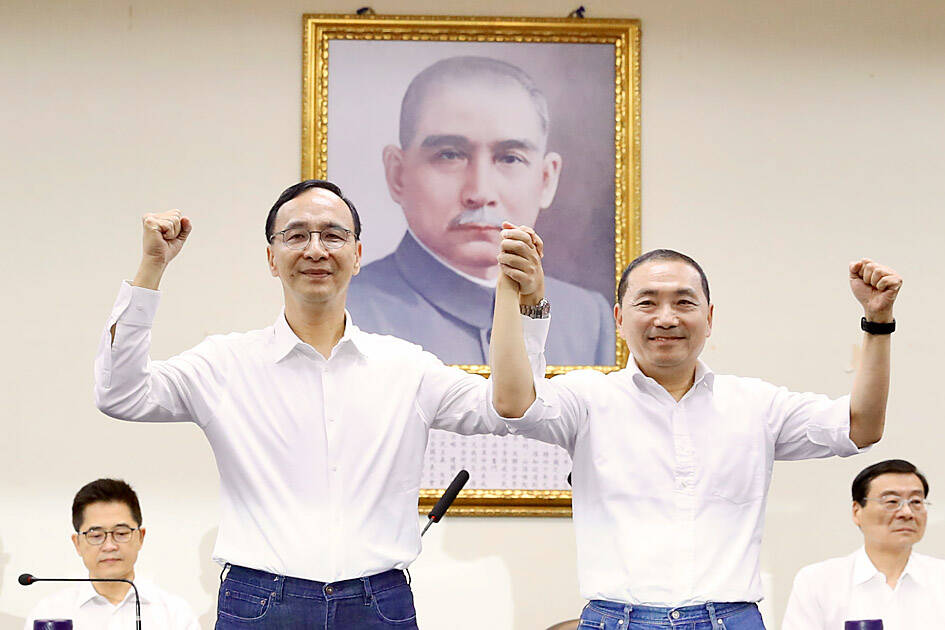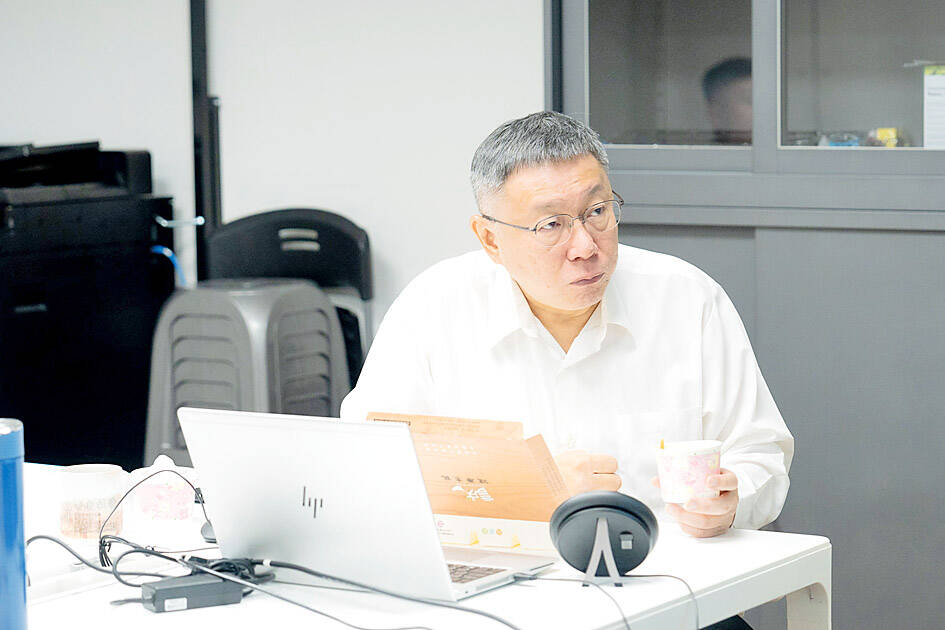The Chinese Nationalist Party (KMT) yesterday nominated New Taipei City Mayor Hou You-yi (侯友宜) as its candidate for next year’s presidential election.
Hon Hai Precision Industry Co founder Terry Gou (郭台銘), who was the other main contender for the KMT nomination, said he would support Hou’s campaign.
KMT Chairman Eric Chu (朱立倫) announced Hou’s nomination at a meeting of the KMT’s Central Standing Committee, which in March tasked Chu with choosing a candidate with the best chance to defeating the ruling Democratic Progressive Party (DPP).

Photo: Ritchie B. Tongo, EPA-EFE
After considering “scientific data and the opinions of local government heads and lawmakers... I solemnly declare that our party has drafted Hou You-yi to run in the Republic of China’s [ROC] 2024 presidential election,” Chu said.
Hou, 65, had been coy about running for president, presumably because he did not want to seem eager to pursue the presidency so soon after being re-elected mayor in November last year.
However, he recently expressed his opinions on Taiwan’s relations with China, purportedly to establish his credentials on major issues before accepting the KMT’s nomination.

Photo: CNA
Last month, Hou said the ROC and Taiwan were like “cup and water,” urging Taiwanese to reach a consensus on that “inseparable” relationship and calling on the international community to recognize the ROC’s existence.
Gou, on the other hand, had advocated accepting the so-called “1992 consensus” to resume dialogue with Beijing and maintain cross-strait peace.
One hour before the committee met yesterday, Gou voiced his support for Hou in a Facebook post, congratulating the mayor on his nomination.
“Mayor Hou has the most solid public support, so it is only natural for him to assume greater responsibility. He is also the best candidate within the KMT,” Gou wrote.
“I will keep my promise and do everything I can to support Mayor Hou to win the 2024 election and get rid of the incompetent government,” he wrote.
Meanwhile, the Taiwan People’s Party (TPP) officially nominated party founder and Chairman Ko Wen-je (柯文哲) as its presidential candidate, setting up a three-way race for the presidency, after the DPP last month nominated Vice President William Lai (賴清德) as its candidate.
Ko was the only TPP member seeking the party’s nomination and his candidacy had been a foregone conclusion for months. His registration information was reviewed by the TPP Central Committee, which approved it at a meeting.
Ko is expected to present his platform, centered on “harmony, reconciliation and peace,” in New Taipei City on Saturday.
Earlier this month, when asked by reporters who his running mate would be, Ko said the TPP welcomed anyone who fit the bill to sign on. He added that Vivian Huang (黃珊珊), one of his deputy mayors during his second mayoral term, would be a “fine candidate.”
There had been speculation that Ko might seek a partnership with Gou, but Ko during a radio interview with former New Power Party legislator Huang Kuo-chang (黃國昌) on Tuesday said Gou was apparently not interested in partnering with him.
Polls have shown Ko to have a support rating of 20 to 25 percent.
As the TPP’s main support base is made up of pan-blue and pan-green camp voters, Ko’s entry into the race has increased the unpredictability of the outcome.
The “1992 consensus,” a term former Mainland Affairs Council chairman Su Chi (蘇起) in 2006 admitted making up in 2000, refers to a tacit understanding between the KMT and the Chinese government that both sides of the Taiwan Strait acknowledge there is “one China,” with each side having its own interpretation of what “China” means.

SEPARATE: The MAC rebutted Beijing’s claim that Taiwan is China’s province, asserting that UN Resolution 2758 neither mentions Taiwan nor grants the PRC authority over it The “status quo” of democratic Taiwan and autocratic China not belonging to each other has long been recognized by the international community, the Mainland Affairs Council (MAC) said yesterday in its rebuttal of Beijing’s claim that Taiwan can only be represented in the UN as “Taiwan, Province of China.” Chinese Minister of Foreign Affairs Wang Yi (王毅) yesterday at a news conference of the third session at the 14th National People’s Congress said that Taiwan can only be referred to as “Taiwan, Province of China” at the UN. Taiwan is an inseparable part of Chinese territory, which is not only history but

NATIONAL SECURITY: The Chinese influencer shared multiple videos on social media in which she claimed Taiwan is a part of China and supported its annexation Freedom of speech does not allow comments by Chinese residents in Taiwan that compromise national security or social stability, the nation’s top officials said yesterday, after the National Immigration Agency (NIA) revoked the residency permit of a Chinese influencer who published videos advocating China annexing Taiwan by force. Taiwan welcomes all foreigners to settle here and make families so long as they “love the land and people of Taiwan,” Premier Cho Jung-tai (卓榮泰) told lawmakers during a plenary session at the Legislative Yuan in Taipei. The public power of the government must be asserted when necessary and the Ministry of

CROSSED A LINE: While entertainers working in China have made pro-China statements before, this time it seriously affected the nation’s security and interests, a source said The Mainland Affairs Council (MAC) late on Saturday night condemned the comments of Taiwanese entertainers who reposted Chinese statements denigrating Taiwan’s sovereignty. The nation’s cross-strait affairs authority issued the statement after several Taiwanese entertainers, including Patty Hou (侯佩岑), Ouyang Nana (歐陽娜娜) and Michelle Chen (陳妍希), on Friday and Saturday shared on their respective Sina Weibo (微博) accounts a post by state broadcaster China Central Television. The post showed an image of a map of Taiwan along with the five stars of the Chinese flag, and the message: “Taiwan is never a country. It never was and never will be.” The post followed remarks

Proposed amendments would forbid the use of all personal electronic devices during school hours in high schools and below, starting from the next school year in August, the Ministry of Education said on Monday. The Regulations on the Use of Mobile Devices at Educational Facilities up to High Schools (高級中等以下學校校園行動載具使用原則) state that mobile devices — defined as mobile phones, laptops, tablets, smartwatches or other wearables — should be turned off at school. The changes would stipulate that use of such devices during class is forbidden, and the devices should be handed to a teacher or the school for safekeeping. The amendments also say